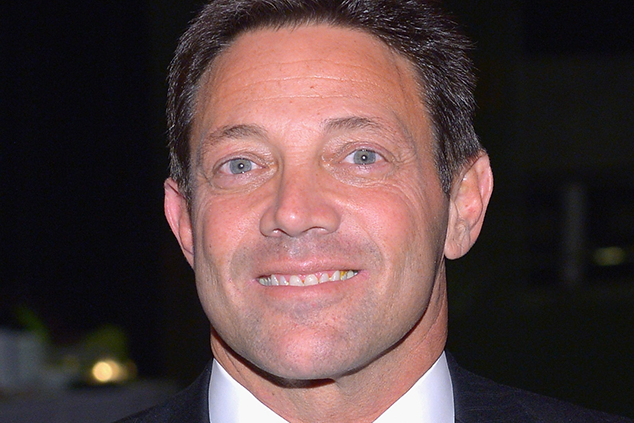Great frauds in history: Jordan Belfort and Stratton Oakmont
Jordan Belfort followed the traditional “boiler room” model of using high-pressure sales techniques to sell shares in dubious companies to investors.

Get the latest financial news, insights and expert analysis from our award-winning MoneyWeek team, to help you understand what really matters when it comes to your finances.
You are now subscribed
Your newsletter sign-up was successful
Want to add more newsletters?

Jordan Belfort (pictured), born in New York in 1962, ran a business selling ice-cream and seafood door-to-door before his firm went bankrupt. He then briefly became a stockbroker with Wall Street firm LF Rothschild, but was fired in the aftermath of the 1987 crash, which caused the bank to collapse. Belfort then joined a "penny stock" firm, Investors Center, before founding Stratton Oakmont, initially as a franchise of Stratton Securities, though he would later buy out the parent firm. During the 1990s Belfort's firm became extremely successful, employing 1,000 people and selling $1bn worth of shares.
What was the scam?
Stratton Oakmont followed the traditional "boiler room" model of using high-pressure sales techniques to sell shares (which Stratton owned) in dubious companies to investors. In many cases, Stratton would lure its clients in by allowing them to make a profit on their initial trade. It would also promise them a large allocation of shares in an initial public offering, only to later claim that the shares were only available at a much higher aftermarket price (created in part by phoney trades). Shortly after all the shares had been sold, the price would quickly collapse.
What happened next?
Stratton Oakmont was in trouble with the authorities almost from its founding in 1989, but it was not until 1996 that it was finally shut down. Even then it would take three more years for Belfort to be indicted for securities fraud and money laundering. Despite admitting to manipulating the stock of 34 companies, Belfort escaped with only a two-year jail sentence thanks to his decision to co-operate with the authorities (co-founder Danny Porush would get four years). Belfort was also required to pay $110m in restitution. The Wolf of Wall Street, a book by Belfort based on his experiences, became a bestseller and was turned into a hit movie, but less than $12m has been recovered from the fraudster, mainly from the initial liquidation of his estate. The 1,513 people who were defrauded by Belfort have only received a fraction of the money that they lost.
Try 6 free issues of MoneyWeek today
Get unparalleled financial insight, analysis and expert opinion you can profit from.

Sign up to Money Morning
Don't miss the latest investment and personal finances news, market analysis, plus money-saving tips with our free twice-daily newsletter
Don't miss the latest investment and personal finances news, market analysis, plus money-saving tips with our free twice-daily newsletter
Lessons for investors
Buying investments on the basis of an unsolicited phone call is rarely a good idea. It might be an idea to pay attention to press reports too: Forbes magazine described him as early as 1991 as "a kind of twisted Robin Hood".
Get the latest financial news, insights and expert analysis from our award-winning MoneyWeek team, to help you understand what really matters when it comes to your finances.

-
 The rare books which are selling for thousands
The rare books which are selling for thousandsRare books have been given a boost by the film Wuthering Heights. So how much are they really selling for?
-
 Pensions vs savings accounts: which is better for building wealth?
Pensions vs savings accounts: which is better for building wealth?Savings accounts with inflation-beating interest rates are a safe place to grow your money, but could you get bigger gains by putting your cash into a pension?
-
Christopher Columbus Wilson: the spiv who cashed in on new-fangled radios
Profiles Christopher Columbus Wilson gave radios away to drum up business in his United Wireless Telegraph Company. The company went bankrupt and Wilson was convicted of fraud.
-
 Great frauds in history: Philip Arnold’s big diamond hoax
Great frauds in history: Philip Arnold’s big diamond hoaxProfiles Philip Arnold and his cousin John Slack lured investors into their mining company by claiming to have discovered large deposit of diamonds. There were no diamonds.
-
Great frauds in history: John MacGregor’s dodgy loans
Profiles When the Royal British Bank fell on hard times, founder John MacGregor started falsifying the accounts and paying dividends out of capital. The bank finally collapsed with liabilities of £539,131
-
Great frauds in history: the Independent West Middlesex Fire and Life Assurance Company's early Ponzi scheme
Profiles The Independent West Middlesex Fire and Life Assurance Company (IWM) offered annuities and life insurance policies at rates that proved too good to be true – thousands of policyholders who had handed over large sums were left with nothing.
-
 Great frauds in history: Alan Bond’s debt-fuelled empire
Great frauds in history: Alan Bond’s debt-fuelled empireProfiles Alan Bond built an empire that encompassed brewing, mining, television on unsustainable amounts of debt, which led to his downfall and imprisonment.
-
 Great frauds in history: Martin Grass’s debt binge
Great frauds in history: Martin Grass’s debt bingeProfiles AS CEO of pharmacy chain Rite Aid. Martin Grass borrowed heavily to fund a string of acquisitions, then cooked the books to manage the debt, inflating profits by $1.6bn.
-
 Great frauds in history: Tino De Angelis’ salad-oil scam
Great frauds in history: Tino De Angelis’ salad-oil scamProfiles Anthony “Tino” De Angelis decided to corner the market in soybean oil and borrowed large amounts of money secured against the salad oil in his company’s storage tanks. Salad oil that turned out to be water.
-
 Great frauds in history: Gerard Lee Bevan’s dangerous debts
Great frauds in history: Gerard Lee Bevan’s dangerous debtsProfiles Gerard Lee Bevan bankrupted a stockbroker and an insurer, wiping out shareholders and partners alike.